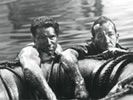Eye For Film >> Movies >> In Which We Serve (1942) Film Review
Although dated, Noel Coward's patriotic war movie captures the mood of Britain in 1942. He starts off with a narrative voice intoning the message: "This is the story of a ship."
Luckily, it's not. It's the story of the men who served on her and the women who stayed behind. Lips are so stiff you wonder how anyone kissed. They don't much. At the end of home leave, sailors march off to the docks with a "Bye old girl", as wives settle back to rationing and the Blitz.

The ship is HMS Torrin and the captain none other than the man who gave the world Don't Put Your Daughter On The Stage, Mrs Worthington. Coward has to prove that he is officer material and not some theatre johnnie with a talent to amuse. He tends to be severe, even when giving the crew a morale-boosting pep talk, and his relationship with the lady wife (Celia Johnson, in her first screen role) is textbook no-touchy-no-feely. He takes his role extremely seriously and, as a result, accumulates considerable respect.
After the ship has sunk and survivors struggle in the water, hanging on to a life raft, flashbacks tell stories of their lives. Or rather, some of their lives. John Mills and Bernard Miles are the main ones. Mills is the cheeky chappie, courting a girl. Miles is comfortably married. Through these scenes of domestic life, an understanding of the danger and community spirit of a city under bombardment is well-drawn.
Although blatantly propagandist, the film has good old-fashioned qualities. Even when mortally wounded, a man will not complain and when the doodle bugs drop out of the night skies, mothers hold their children close and wait. There is no panic.
On the Torrin, one able seaman leaves his post during a battle, so afraid he can't speak. The captain remarks upon it later, but does not punish the man, who is played by a baby-faced young actor straight out of drama school, called Richard Attenborough.
Coward was nervous of directing, since his experience had been entirely in the theatre, and so asked John Mills if he knew of anyone who might give him a hand. Mills suggested "the best editor in the country." He was hired. His name was David Lean.
Reviewed on: 05 Feb 2002



















